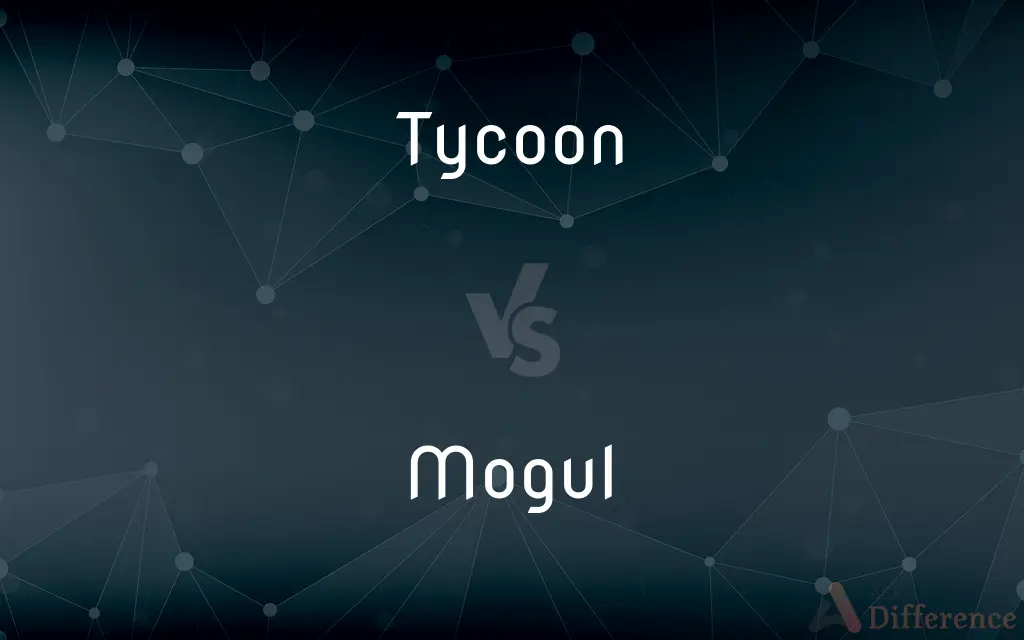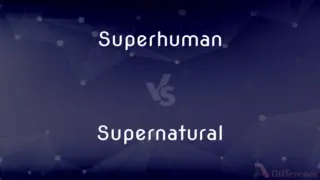Tycoon vs. Mogul — What's the Difference?
Edited by Tayyaba Rehman — By Fiza Rafique — Updated on April 20, 2024
Tycoons are influential business leaders known for their wealth and power in a particular industry, whereas moguls are often associated with dominance in media or entertainment sectors.

Difference Between Tycoon and Mogul
Table of Contents
ADVERTISEMENT
Key Differences
A tycoon is typically a powerful business person who has achieved great success and influence within their industry. Whereas a mogul, although similar in power and success, is frequently linked to the media, entertainment, or similar high-profile industries.
Tycoons are often involved in industries like technology, manufacturing, or finance, showcasing their ability to innovate and drive economic growth. On the other hand, moguls are more prominent in industries that shape culture and public opinion, such as film, television, and music.
The term "tycoon" originates from the Japanese word "taikun," which means a great lord or prince, emphasizing their high status and command over their businesses. Moguls, however, derive their title from the historic Mongol conquerors, reflecting their ambition to dominate and influence.
Tycoons are celebrated for their strategic acumen and ability to navigate complex business environments to build and sustain large corporations. In contrast, moguls are often admired for their creative instincts and the ability to captivate audiences through media ventures.
While tycoons might prioritize financial performance and market expansion, moguls tend to focus on branding, public relations, and visibility, often becoming celebrities in their own right.
ADVERTISEMENT
Comparison Chart
Industry Focus
Diverse sectors like technology, finance
Primarily media, entertainment
Origin of Term
Japanese "taikun," meaning great lord
From "Moghul," historic empire builders
Typical Traits
Business acumen, strategic, innovation
Creative, influential in public opinion
Public Perception
Viewed as powerful business leaders
Often seen as celebrity-like figures
Key Influence
Economic growth, corporate success
Cultural influence, trendsetting in media
Compare with Definitions
Tycoon
Someone who builds and maintains large businesses.
The railroad tycoon owned extensive networks across the country.
Mogul
A powerful person in the media or entertainment industry.
The film mogul launched numerous successful careers.
Tycoon
An individual who has considerable power within a particular industry.
Being a tycoon, he could affect market trends significantly.
Mogul
Frequently involved in production and promotion.
The TV mogul expanded her network to include a streaming service.
Tycoon
Often synonymous with magnate or baron.
Known as a shipping tycoon, his fleet dominated international waters.
Mogul
Someone who influences through media dominance.
As a music mogul, his labels produced top charting albums.
Tycoon
A prominent business leader known for their wealth and influence.
The tech tycoon invested millions in new startups.
Mogul
A figure often associated with celebrity status.
The media mogul was as famous as the stars in his films.
Tycoon
A leader whose decisions impact the global economy.
The oil tycoon's strategies were pivotal during the crisis.
Mogul
Known for their ability to shape public opinion and trends.
The fashion mogul set trends that swept across the globe.
Tycoon
A wealthy and powerful businessperson or industrialist; a magnate.
Mogul
A small hard mound of snow on a ski slope, cast up over numerous runs by the skis of skiers as they turn.
Tycoon
Used formerly as a title for a Japanese shogun.
Mogul
One of a set of closely spaced, artificially constructed mounds forming the course for certain competitive skiing events.
Tycoon
A wealthy and powerful business person.
Chairman Yu is a tycoon who owns multiple hotel chains.
Mogul
Moguls(used with a sing. or pl. verb) A skiing event held on such a course.
Tycoon
A type of Roblox game in which players earn money which is then used to purchase upgrades.
Mogul
A very rich or powerful person; a magnate.
Tycoon
The title by which the shogun, or former commander in chief of the Japanese army, was known to foreigners.
Mogul
Mogul Variant of Mughal.
Tycoon
A very wealthy or powerful businessman;
An oil baron
Mogul
A member of the force that under Baber invaded India in 1526.
Mogul
A member of the Muslim dynasty founded by Baber that ruled India until 1857.
Mogul
A rich or powerful person; a magnate, nabob.
A Silicon Valley tech mogul
Mogul
(skiing) A hump or bump on a skiing piste.
Mogul
A larger-sized (39 mm diameter) screw base used for large, high-power light bulbs, known as mogul (screw) base light bulbs.
Mogul
A machine that forms shaped candies from syrups or gels.
Mogul
(skiing) To ski over a course of humps or bumps.
Mogul
A person of the Mongolian race.
Mogul
Any of the Mongolian peoples who conquered parts of India and established an empire lasting from 1526 to 1857. Also, any of their descendents.
Mogul
A heavy locomotive for freight traffic, having three pairs of connected driving wheels and a two-wheeled truck.
Mogul
A great personage; magnate; autocrat; as, an industrial mogul.
Mogul
A bump on a ski slope
Mogul
A member of the Muslim dynasty that ruled India until 1857
Mogul
A very wealthy or powerful businessman;
An oil baron
Common Curiosities
Are moguls always involved in entertainment?
While not exclusively, moguls are predominantly influential in the entertainment and media sectors.
What is the origin of the word "tycoon"?
It comes from the Japanese word "taikun," which translates to great lord or prince.
How do moguls impact popular culture?
Moguls significantly shape and influence popular culture through media, trends, and public opinion.
Is there a difference in the public perception of tycoons and moguls?
Yes, tycoons are generally seen as powerful business figures, while moguls are often viewed as celebrity-like influencers.
What traits are common among tycoons?
Strategic thinking, innovation, and a focus on economic growth are common traits among tycoons.
Can a tycoon also be a mogul?
Yes, if their influence and operations extend into media and entertainment, a tycoon can also be considered a mogul.
Do tycoons often become public figures?
Yes, due to their significant business roles and impacts, tycoons often become well-known public figures.
What is the historical significance of the term "mogul"?
It refers to the Moghul Empire, known for its significant rulers and expansive influence.
What industries do tycoons typically dominate?
Tycoons are most prevalent in sectors like technology, finance, and manufacturing.
What traits define a mogul?
Creativity, media dominance, and the ability to influence public opinion are key traits of moguls.
What can someone learn from studying famous tycoons and moguls?
Lessons in leadership, innovation, media influence, and cultural impact can be learned from studying prominent tycoons and moguls.
How do tycoons impact the economy?
They drive economic growth through innovation, job creation, and market expansion.
Can a mogul be influential in industries other than media?
While they are most notable in media, moguls can have interests and influence in various sectors.
What is the significance of moguls in the entertainment industry?
They play crucial roles in shaping media landscapes, launching careers, and setting entertainment trends.
How do moguls and tycoons differ in their approach to business?
Tycoons focus on strategic and economic aspects, while moguls focus more on branding and public relations.
Share Your Discovery

Previous Comparison
Superhuman vs. Supernatural
Next Comparison
Hull vs. HuskAuthor Spotlight
Written by
Fiza RafiqueFiza Rafique is a skilled content writer at AskDifference.com, where she meticulously refines and enhances written pieces. Drawing from her vast editorial expertise, Fiza ensures clarity, accuracy, and precision in every article. Passionate about language, she continually seeks to elevate the quality of content for readers worldwide.
Edited by
Tayyaba RehmanTayyaba Rehman is a distinguished writer, currently serving as a primary contributor to askdifference.com. As a researcher in semantics and etymology, Tayyaba's passion for the complexity of languages and their distinctions has found a perfect home on the platform. Tayyaba delves into the intricacies of language, distinguishing between commonly confused words and phrases, thereby providing clarity for readers worldwide.
















































